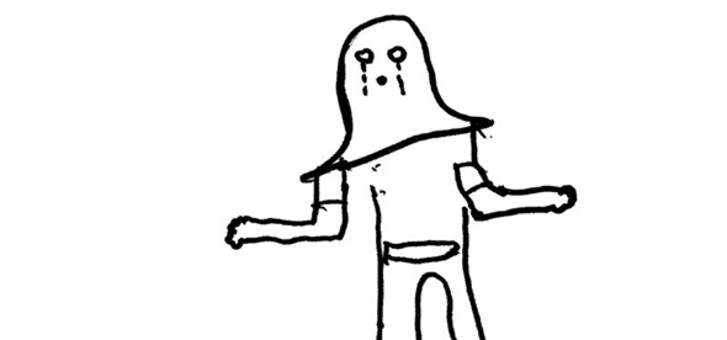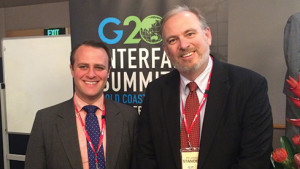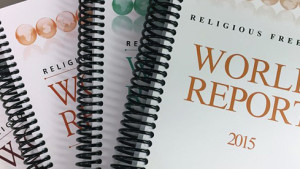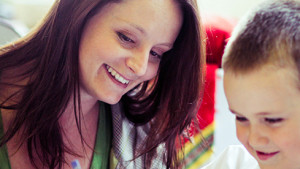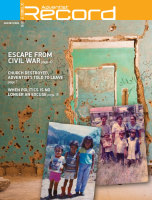The drawing shown here is disturbing. What’s more disturbing is that it was created by a seven-year-old. When I asked a psychiatrist friend who works with children in trauma what she read into it, she said the drawing, in all likelihood, depicted torture. Not torture of the child—the drawing would have been more fragmented than it is if that had been the case—but of an older person, probably a parent or relative.
She pointed out the hood and the ligatures on the arms where this person is bound with arms outstretched and the sense of helplessness it depicts. Then, in her words, “The tears depict the emotions for which there are no words!”
What my psychiatrist friend did not know was that it was drawn by an asylum seeker in detention. I’m not suggesting that torture is occurring in Australia’s detention centres but this drawing could be an expression of trauma experienced by this child before coming to Australia. This child needs help, not more punishment by being locked up in a detention centre.
And this is part of the humanitarian issue our detention centres have created. Yet there’s this fascinating Adventist phenomenon where we hold back from standing up for a child like this because it is a “political” issue. It isn’t our problem because “we” don’t get involved in politics.
As one who values the separation of church and state, I understand this position. But as a human I sense the pain being felt by this child. And as a follower of Jesus I ask, aren’t there times when human need is bigger than politics?
Adventists taking on the government
The problem with the "we-don’t-get-involved-in-politics" position is that we have and we do. In Australia, the Adventist Church became a major force to bring change to the proposed constitution in the late 1890s. Though small in number, we were a force to be reckoned with.
The concerns we had were, predictably, about the separation of church and state: the mention of God in the constitution; and the fear and possibility of a state religion being set up.
We protested. We organised two meetings in Parramatta where 500 turned up each time. We created a quarterly magazine, Australian Sentinel and Herald of Liberty. It was sent to every politician and influential person in the land. It looked at clauses in the constitution with religious connotations.
God was left in the constitution but the insertion of Section 116 giving the free exercise of religion was a victory. Historian Richard Ely paid tribute to us when he wrote that despite our belief in separation of church and state, “Adventist[s] played politics very well.”1
Religious liberty has always been for us a political favourite. When the United Nations was set up, we had three representatives there to argue for religious freedom. They even lobbied Eleanor Roosevelt on the issue. We still have a representative at the United Nations. The current editor of Record held that position before we stole him away.
I’m proud of the work we do on religious liberty. Despite it being somewhat self-serving—as a minority Christian group we want freedom to worship on Sabbath—we have a proven record of defending religious freedom for many and various groups around the world. Religious liberty—a political issue—is bigger than mere politics.
In many of our churches in Australia last year petitions against same-sex marriage were circulated. How can this be if “we” don’t get involved in politics? It was seen as a moral issue—something bigger than mere politics. The same could be said of the recent Australian Union Conference decision to commit our Church to tackling gambling.
Of course, we should work with governments and be loyal citizens. But there are times when loyalty to God’s way comes first. We may never be confronted with a Shadrach, Meshach and Abednego challenge but we’re often confronted with human need. How we respond, or don’t respond, demonstrates where our real loyalties lie.
Adventism’s broader position
From our beginnings we’ve taken a stand on a number of political causes and issues. These include “civil rights and anti-slavery, religious liberty, health and temperance reform, leadership in prevention of alcoholism and drug dependency, anti-tobacco lobby, education, welfare, aid and development and so on”.2
In the past decade, in the United States, our Church has been actively involved including supporting the freedom to build churches, mosques and other houses of worship, legislation to prevent rape in prisons, visas for those who have been trafficked, the regulation of tobacco products, and more.
In a statement on church-state relationships, our Church has defined the role of governments to serve the needs of the governed. That includes such things as the protection of human rights, public order, health, a clean environment, an atmosphere that encourages the growth of its people, and to eliminate discrimination. “When we are faced with a situation in which the law of the land conflicts with biblical mandates, however, we concur with the scriptural injunction that we ought to obey God rather than man,” the statement says.
Some things are more important than mere politics.
Then, there’s this: “States have a responsibility not only to protect all those living within its borders but also to work for the protection of human rights in the international community and to provide a haven to those fleeing persecution.” 3
The evidence is overwhelming that our detention centres are not havens for asylum seekers.
It’s bigger than politics
There are times we need to make a stand—particularly when people are being hurt. We currently have asylum seekers in detention centres in Australia and on Manus and Nauru islands. Some of them have been in detention for more than six years. That’s far too long. Too many people are being harmed.
Professor David Isaacs, a Sydney-based paediatrician, was recently interviewed on the ABC’s 7.30 Report. He told of a visit to Nauru and meeting a six-year-old girl. He noticed her neck was scarred and asked about what had happened. She had tried to hang herself.
There’s something evil happening when a six-year-old thinks killing herself is a solution to what she is facing. We can’t allow mere politics to guide our reaction to what is a humanitarian issue.
Under recently passed legislation, Professor Isaacs said he was in a situation where if he didn’t report child abuse in Australia he would be in trouble. However, if he reported child abuse on Nauru he could go to prison. There’s an unfortunate and skewed kind of morality at work here.
If you aren’t convinced that holding asylum seekers in detention centres isn’t bigger than politics, look again at the drawing created by the seven-year-old seeker.4 And remember that Jesus warned religious people to not get so caught up in their religious observance that they forget “justice, mercy and faith” (Matthew 23:23, NLT).
The problem with detention centres
Australia’s current use of offshore detention centres has created three major issues that need addressing:
The resources issue: The United Nations spends $3.72 billion a year to support 46.3 million asylum seekers and refugees around the world. Australia spent more than a third of that—$1.3 billion—to keep fewer than 2000 asylum seekers on Manus and Nauru Islands (2014-15 financial year).5
The ethics issue: There is an ethical problem with punishing one group of people (asylum seekers placed in off-shore detention) to stop others from attempting to get to Australia. That’s like my father punishing me for something I haven’t done wrong (being an asylum seeker is not illegal) so my brother won’t do it—and to keep on punishing me for six years (how long some asylum seekers have been interred).
The human issue: Obviously this is the most important. So many people are being damaged by a policy that locks up people for an indeterminate time. And because of recent legislation, we no longer hear about some situations—which is, of course, another issue in a democratic society.
-
Richard Ely, Unto God and Caesar, Melbourne University Press, Melbourne, 1976, pages 44, 45.
-
www.adventist.org/information/official-statements
-
www.adventist.org/en/information/official-statements/documents/article/go/0/church-state-relations
-
Image in the 2014 “Forgotten Children” report, page 172, which can be found atwww.humanrights.gov.au/sites/default/files/document/publication/forgotten_children_2014.pdf
-
Figures from ABC Fact Check: www.abc.net.au/news/2015-07-14/cost-of-offshore-processing-united-nations-fact-check/6609764
Bruce Manners is a retired pastor and a member of Adventists Supporting Asylum Seekers in Detention Centres.

